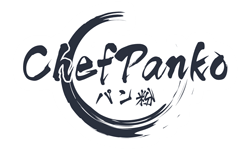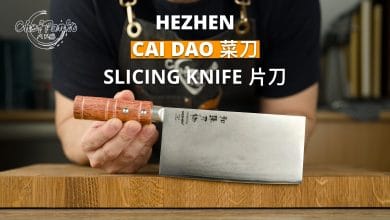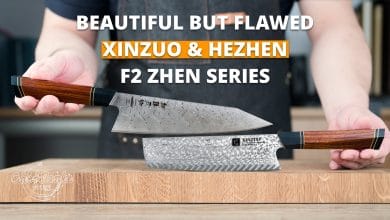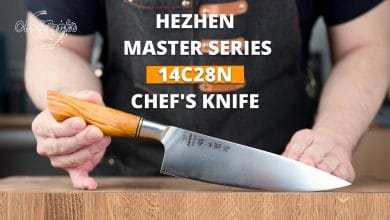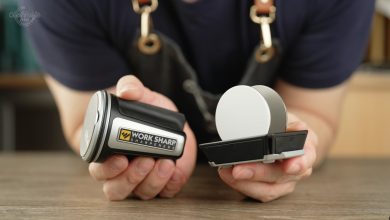The Yu Kurosaki Shizuku Gyuto has an SG2 or also called R2 core material, and comes with an outer softer stainless steel cladding. The cladding is very visible and adds to the aesthetics of the knife. The blade has a chiseled hammered finish and comes with a brushed vertical finish above the knife profile, which helps break down water content from food to stick less on your blade. The knife comes with a half-tang octagonal rosewood handle, which means that the blade is partially glued into the handle.
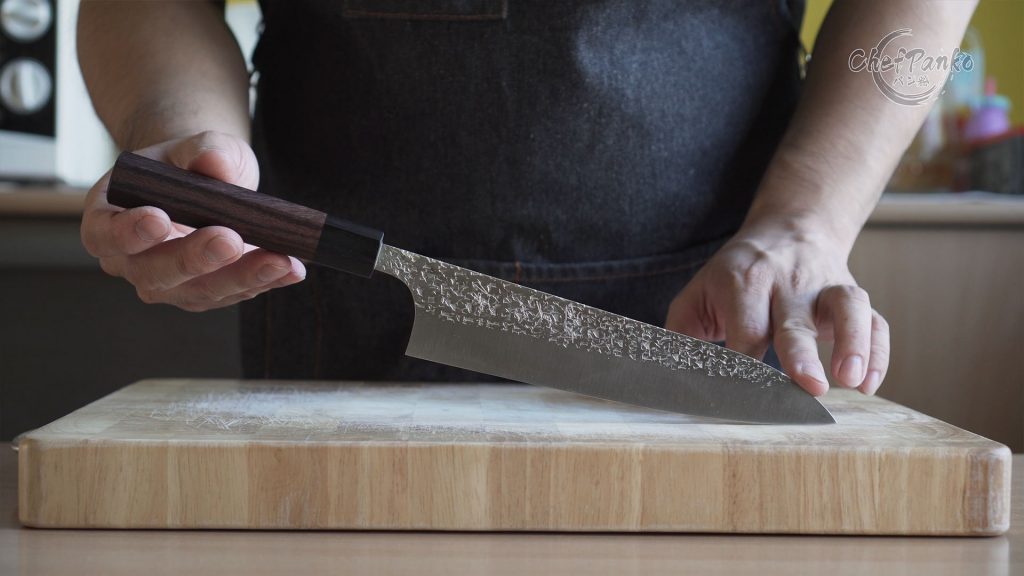
Knife Rockwell Hardness and Core Material
The knife’s Rockwell hardness is specified with a Rockwell of 63. If used at home, you can get away with 8 to 9 months before needing a whetstone touch-up if you regularly hone your knife with a honing rod. The SG2, also called R2 powdered steel, has excellent rust and corrosion-resistant properties. Most Japanese knives with a high Rockwell hardness go for a sharper knife over durability. That is also why they add cladding to protect the blade from any potential damage, and it prevents the knife from breaking. Since the knife prioritizes sharpness over durability, you need to keep in mind that you can not do the following things. It should not be used to slice through frozen food, bones, cheese, or hard bread, or force your way through other food like chocolate or nuts, and you should not twist or pry the food open with the knife since that can cause chipping.
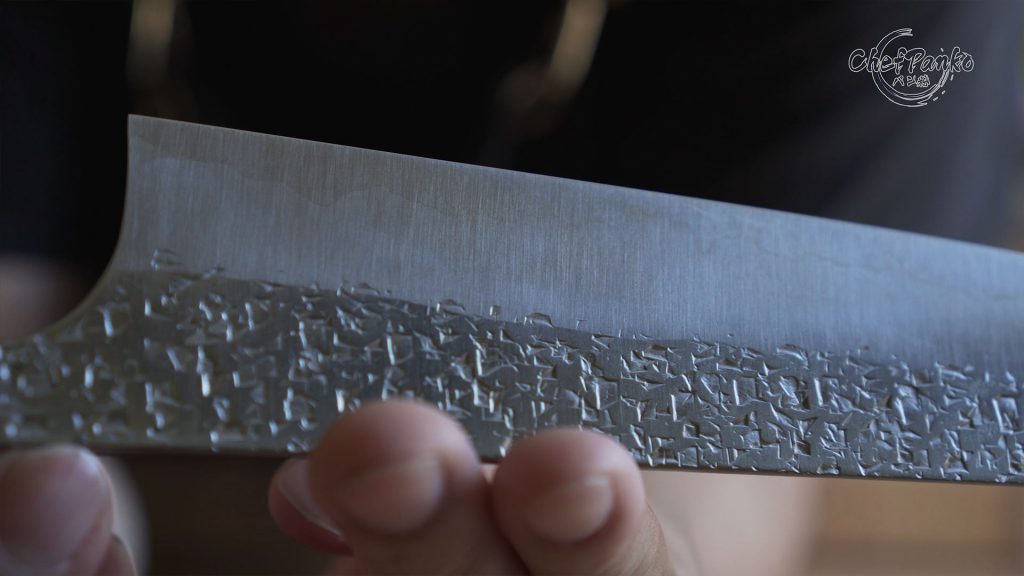
Blade aesthetic and food release
Yu Kurosaki added a very artistic hammered pattern on the knife, which helps prevent food from sticking on your blade. The blade also has a rough polish with deep vertical scratch lines, which helps break down water content, so that food will not resist your cut because it can’t use suction from the water content to cling onto your blade.

Blade profile
The blade profile of this Gyuto is also very nicely done. It maintains a straight blade while having a gentle curve at the front. The heel of the knife has a slight curve to prevent any hard stops.

Knife balance point
The knife balance point of this knife is in front of the chiseled Kanji. Depending on the gripping style, the knife balance point will shift. It is considered front-heavy if you pinch grip the knife at the neck area. If you pinch grip at the blade or in front of the chiseled Kanji, the knife will be middle-balanced. Keep in mind that you shift your middle fingers toward the choil by doing so. Yu Kurosaki rounded the choil area and polished it nicely so there won’t be any discomfort if you grip the knife a bit more in front of the chiseled Kanji.
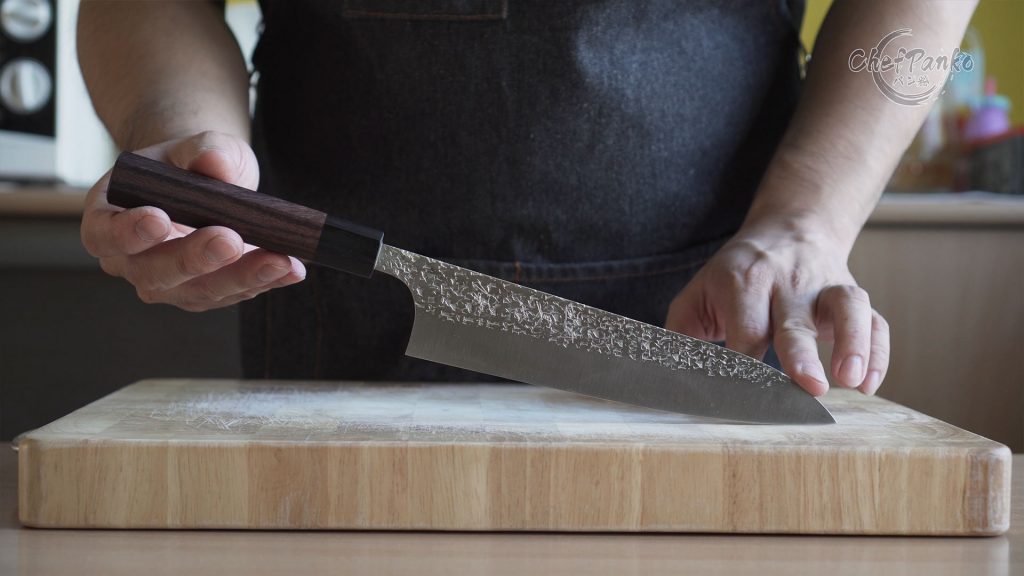
Knife handle
The traditional handle is an octagonal handle, which is a well-balanced design for comfort and grip. The handle comes with a rosewood handle, and when the handle starts to feel dry, you can apply a thin layer of mineral oil. It will prevent the wooden handle from drying out and splitting. Most traditional handles come with a colored top part. This top part is usually a thin layer of resin to prevent water damage on the rosewood handle. The downside of this kind of handle is its durability; a traditional handle is less impact-resistant since it is partially glued into the handle. However, a Japanese knife with a high Rockwell isn’t impact-resistant in the first place. Therefore I do not recommend the handle grip since it affects the glued part and blade.
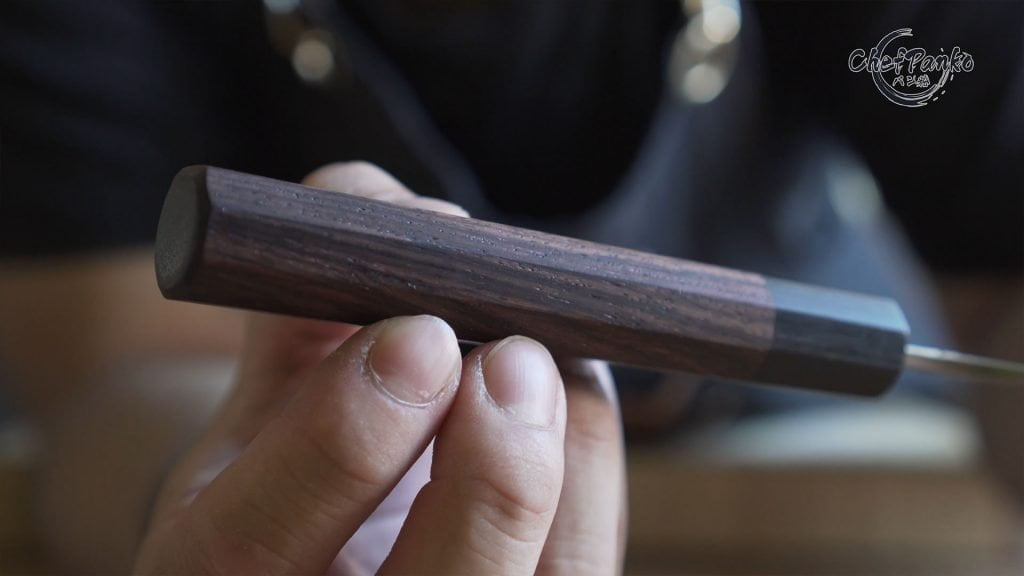
Fit and Finish and distal spine taper
The spine and the choil are nicely polished. The rounded heel area is also comfortable for those that want extra control by shifting the grip to the front. The knife also has a distal spine taper, and there is no noticeable flex during use.

What makes Yu Kurosaki knives unique?
The most exciting part about the Yu Kurosaki knives is that he starts with a very thick neck area and adds a very aggressive distal spine taper. It adds extra grip and comfort when you pinch grip at the neck area. You also get a sturdier glued part compared to a thinner neck. It is also interesting to know that this knife is front-heavy and dependent on your preference. This balance point is not for everyone. However, you can always shift your grip a bit more forward for a middle balance point. In return, you also get more control, and it is ideal for more precise cutting work. Despite the thicker spine, he managed to reduce the weight without sacrificing the sharpness. The sharpness is maintained because of the lovely profile taper. And at last, there is also plenty of knuckle clearance on the knife.
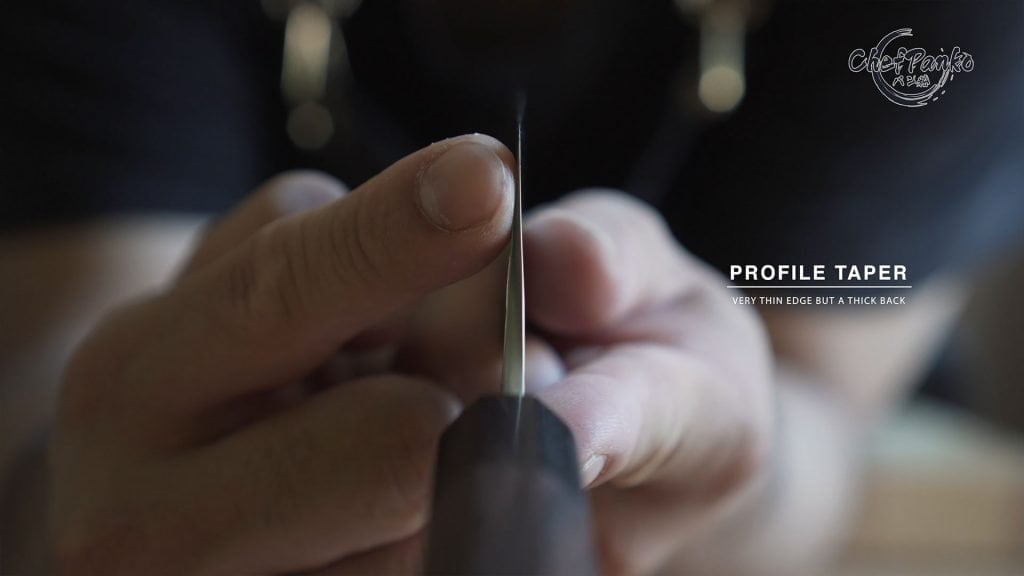
Suitable for home cooks?
The knife is suitable for home cooks. However, you must know what you can and can not do with it. It is also advisable that you know how to sharpen your knives properly before investing in this knife. Considering the price point, you will regret damaging the blade due to improper use or a lack of knowledge of what it is capable of doing.

Suitable for professional cooks?
While the knife is suitable for professional cooks, you need to consider where you want to use the knife. You will love how long the knife will stay sharp without needing to hone the edge.
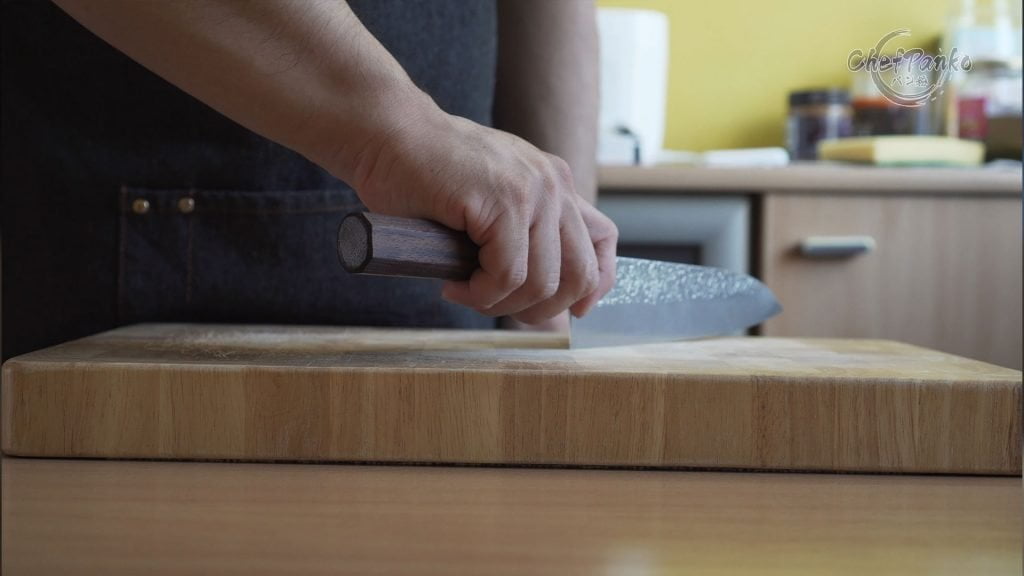
Maintenance and Care
Now on to this knife’s care and maintenance, it is not recommended to use a diamond honing rod or a coarse like an 800 grit ceramic rod. My recommendation is a ceramic rod with a minimum of 1000 grit. The higher you go, the less material you remove with each honing session. It is also inadvisable to use a bamboo cutting board since bamboo is quite hard and will dull the knife faster. You should always handwash and dry your knife after use since this prevents water damage on the blade and handle. You should never use the sponge’s abrasive side or any abrasive material to clean the knife. You will destroy the polish of the knife and remove the vertical lines that were added to break down water content from the food.

N O T E S:
Yu Kurosaki knives are very popular and the retailers might be out of stock for a long period of time. Each knife will differ slightly with the measurements, the cladding and chiseled hammered look will not be the same on each knife.
▶ If you want to know what knife you should buy you can read the following article ''Choosing your knife''. ▶ On my youtube channel, I have reviewed a lot of different knives. You can watch the playlist by clicking here. ▶ Click here, if you want to search for other kitchen knives on: Amazon. ▶ , if you want to search for other Chinese knives on . ▶ Check out my gear on Kit: https://kit.co/ChefPanko ▶ Check out my recommendation on Amazon: https://www.amazon.com/shop/chefpanko Full Disclosure: If you purchase from these links I get a small commission that goes towards supporting the channel and website. As an Amazon Associate, I earn from qualifying purchases ▶ If you have any questions about Japanese knives made in China or about some of the brands feel free to ask it in the comment section below. Thank you for your support and feedback. ▶ Want to work with me? Please use the contact form by clicking here.
